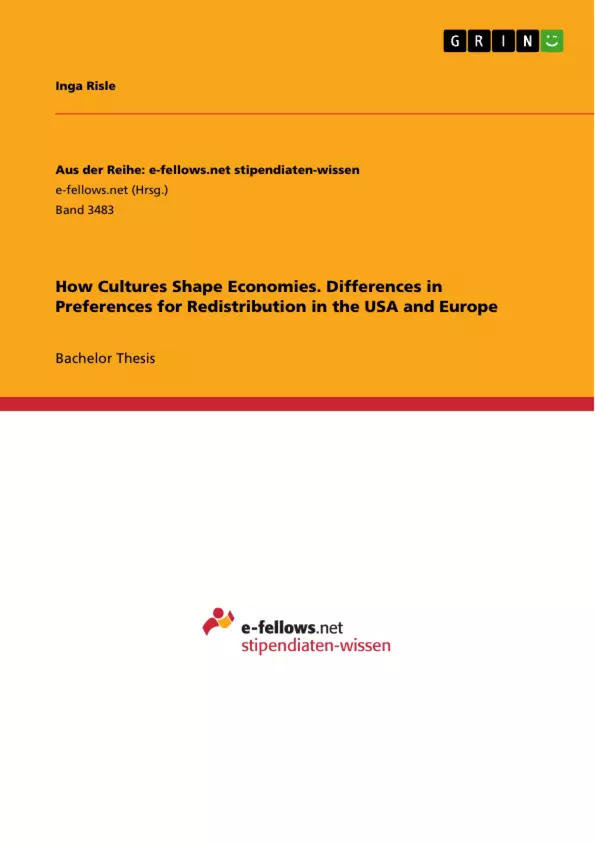There is a remarkable difference in preferences for redistribution in Europe compared to the USA. Various authors have already attempted to explain this difference and provide empirical data on the matter, indicating that cultural and historical contrasts lead to different preferences. The topic of this paper is the question of how these differences can be explained by cultural imprints.
Research shows that redistributive preferences are influenced by views on fairness, the level of altruism and beliefs about income mobility and efficiency. Cultural predispositions can shed light on contrasting fairness views and divergent social beliefs. Therefore, cultural theories and core cultural concepts such as American Exceptionalism will be introduced in order to enable an interpretation of economic research papers on redistribution from a cultural perspective. By combining the findings of cultural, as well as economical literature a new perspective and different understanding of the reasons for contrasting redistributive preferences can be gained.
Inhaltsverzeichnis (Table of Contents)
- 1. Introduction
- 2. Key Terminology of Distributive Justice and Equality.
- 2.1 Distributive Justice
- 2.2 Fairness: Equality Versus Inequality
- 3. Culture
- 3.1. Definition of Culture.
- 3.2. American Cultural Concepts
- 4. Alesina, A. and G.M. Angeletos: Fairness and Redistribution..........\n..15
- 5. Alesina, A. et al.: Why Doesn't the United States Have a European-Style Welfare\nState?
- 6. Almås, I. et al.: Cutthroat Capitalism versus Cuddly Socialism: Are Americans\nMore Meritocratic and Efficiency-Seeking than Scandinavians?
- 7. Conclusion........
Zielsetzung und Themenschwerpunkte (Objectives and Key Themes)
This paper aims to investigate the differences in preferences for redistribution between the USA and Europe, specifically exploring how cultural imprints contribute to these disparities. The research delves into the influence of cultural concepts on individuals' perceptions of fairness, altruism, and beliefs regarding income mobility and efficiency, which in turn shape their views on redistribution. By analyzing relevant research papers and incorporating a cultural perspective, the paper seeks to provide a nuanced understanding of the reasons behind contrasting redistributive preferences.
- Cultural influences on distributive preferences
- Contrasting preferences for redistribution in the USA and Europe
- The role of fairness and altruism in redistributive choices
- American cultural concepts like The American Dream, Individualism, and American Exceptionalism
- Economic research on redistribution from a cultural perspective
Zusammenfassung der Kapitel (Chapter Summaries)
The paper begins by introducing key terminology related to distributive justice and equality, particularly focusing on concepts of fairness and the tension between equality and inequality. It then delves into the concept of culture, providing a definition and exploring specific American cultural concepts, such as The American Dream, Individualism, and American Exceptionalism.
The paper subsequently examines three research papers that investigate the relationship between culture and redistribution preferences. These papers focus on different aspects of the relationship, including the influence of fairness, altruism, and beliefs about income mobility and efficiency. Through a discussion of these papers, the author highlights how cultural imprints play a significant role in shaping individual preferences for redistribution.
Schlüsselwörter (Keywords)
The core keywords of this paper include: distributive justice, equality, fairness, redistribution, culture, American Exceptionalism, individualism, The American Dream, social spending, income inequality, and redistributive preferences.
Frequently Asked Questions
How does culture influence economic preferences for redistribution?
Cultural imprints shape views on fairness, altruism, and beliefs about social mobility. These predispositions determine whether individuals support high government social spending or prefer market-based outcomes.
What is American Exceptionalism in the context of redistribution?
It refers to the unique American belief in individualism and the "American Dream," where success is seen as a result of hard work rather than luck, leading to a lower preference for welfare states compared to Europe.
What is the difference between "Cutthroat Capitalism" and "Cuddly Socialism"?
This concept compares the US model (meritocratic, efficiency-seeking) with the Scandinavian model (high redistribution, social safety nets), highlighting different cultural priorities regarding equality and incentives.
How do beliefs about income mobility affect redistribution views?
If people believe that moving from poor to rich is easy (high mobility), they are less likely to support redistribution. If they believe poverty is a trap, they favor more government intervention.
What role does fairness play in economic justice?
Fairness is a central terminology in distributive justice; it explores the tension between equality of outcome and equality of opportunity, which varies significantly between European and US cultures.
- Arbeit zitieren
- Inga Risle (Autor:in), 2020, How Cultures Shape Economies. Differences in Preferences for Redistribution in the USA and Europe, München, GRIN Verlag, https://www.grin.com/document/902700



